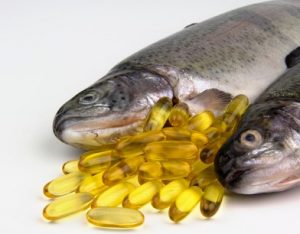Will Omega-3s Turn Your Kid Into A Genius?
Author: Dr. Stephen Chaney
 You have probably heard the old saying that fish is brain food. Is it true? Could eating fish make your kid(s) smarter?
You have probably heard the old saying that fish is brain food. Is it true? Could eating fish make your kid(s) smarter?
It is certainly a plausible hypothesis. Many fish are good sources of long chain omega-3s (omega-3 fatty acids). Long chain omega-3s, particularly DHA, are an important part of the myelin sheath that coats our neurons.
We can think of the myelin sheath as analogous to the plastic coating on electrical wiring. The coating on electrical wires assures that the electrical signal gets from the beginning of the wire to the end without shorting out somewhere in the middle. The myelin sheath plays a similar role for our neurons.
A number of clinical studies suggest that adequate intake of fish and/or fish oil during pregnancy and the early stages of childhood is important for brain development. Other studies suggest that omega-3 supplementation may improve mental focus and reading skills in school-age children.
The current clinical study (J Liu et al, Scientific Reports, 7: 17961, 2017) looked at the effect of fish consumption in Chinese children aged 9-11 on their IQ score measured at age 12.
How Was The Study Done?
 This study included 541 Chinese school children who were part of an ongoing prospective longitudinal study. [That is scientific jargon meaning that one variable (diet) was measured at the beginning of the study and correlated with a second variable (IQ) measured several years later.]
This study included 541 Chinese school children who were part of an ongoing prospective longitudinal study. [That is scientific jargon meaning that one variable (diet) was measured at the beginning of the study and correlated with a second variable (IQ) measured several years later.]
The children were asked to fill out a food frequency questionnaire at ages 9-11. Fish intake frequency was measured by asking the children: “How often do you consume fish in a typical month?” The children were required to choose from:
- seldom (less than 2 times per month),
- sometimes (2-3 times per month), and
- often (at least once a week).
It was assumed that the children might not have known what kind of fish their mothers prepared, so they were not asked to identify the kind of fish they ate.
At the time the children were enrolled in the program the investigators collected data on 13 other variables which might influence IQ. These variables included:
- Gender
- Parent’s education.
- Parent’s occupation.
- Parent’s marital status.
- Whether the child was breastfed or not.
- Duration of breastfeeding.
- Home location.
- Siblings.
- Breakfast consumption (previous research has suggested breakfast intake may influence cognition).
At age 12 the IQ of the children was assessed using the Chinese version of a standard IQ test. The IQ tests were administered independently by two trained investigators to minimize investigator bias.
- Verbal IQ was assessed based on:
- Information Recall.
- Comprehension
- Arithmetic
- Vocabulary
- Recognition of Similarities.
- Performance IQ was assessed based on:
- Picture Arrangement.
- Picture Completion.
- Object Assembly.
- Block Design.
- Coding
- Mazes
- The Total IQ score was based on a combination of the Verbal and Performance scores.
The study measured the impact of fish consumption at ages 9-11 on IQ at age 12 and included statistical correction for other variables that might have influenced IQ.
Can Eating Fish Make Your Kids Smarter?
 When the children who frequently consumed fish (≥once a week) were compared to children who seldom consumed fish (˂2 times a month), their IQ scores were:
When the children who frequently consumed fish (≥once a week) were compared to children who seldom consumed fish (˂2 times a month), their IQ scores were:
- 75 points higher in verbal IQ.
- 79 points higher in performance IQ.
- 80 points higher in total IQ.
When the children who sometimes consumed fish (2-3 times a month) were compared to children who seldom consumed fish, their IQ scores were:
- 92 points higher in verbal IQ.
- 52 points higher in performance IQ.
- 31 points higher in total IQ.
These data are consistent with previous studies showing that both dietary fish and omega-3 intake are associated with improved cognitive and academic performance in school age children.
[Note: This study also suggested that fish consumption may improve sleep quality, and the improved sleep quality may influence IQ. This is a complex subject. As such, it is best discussed in a future issue of “Health Tips From the Professor”.]
What Are the Strengths And Weaknesses Of This Study?
Strengths: The strengths of the study were:
- It was a relatively large study.
- Fish consumption was measured 1-3 years earlier than IQ.
 The association between fish consumption and IQ remained significant after adjusting for 13 other variables known to influence IQ.
The association between fish consumption and IQ remained significant after adjusting for 13 other variables known to influence IQ.- There was a clear dose-response relationship between the three levels of fish consumption.
- It is consistent with a number of other studies showing that fish/omega-3 intake improves cognitive performance in children.
Thus, the authors concluded: “We believe the findings cannot be easily attributed to chance and that, instead, they reflect a reliable relationship between early, frequent fish consumption and later, improved cognitive performance.”
Weaknesses: The weaknesses of the study were:
 It did not ask what kinds of fish the children were eating. Some fish are much better sources of omega-3s than others, so it is not entirely accurate to attribute the higher IQ to omega-3 intake.
It did not ask what kinds of fish the children were eating. Some fish are much better sources of omega-3s than others, so it is not entirely accurate to attribute the higher IQ to omega-3 intake.- It did not assess the effect of “diet context” on the results. The Chinese diet is a primarily plant-based, low-fat diet. It is unclear whether eating fish once a week would have the same effect on IQ in the context of a typical American diet.
- It is an “association study.” It simply measured the association between fish consumption and IQ. It does not prove cause and effect.
Finally, this is the first study to measure the correlation between fish consumption and IQ in this age group. Clearly, more experiments are needed to confirm these findings.
Will Omega-3s Turn Your Kid Into A Genius?
 Who wouldn’t want their children or grandchildren to have higher IQs?
Who wouldn’t want their children or grandchildren to have higher IQs?
However, I wouldn’t read too much into a study like this.
Let me share some perspective by way of a personal story. When I was in grade school, every child was given an IQ test and an aptitude test (I scored very low on anything mechanical in the aptitude test, which my wife can attest to.)
We children, as might be expected, shared our IQ scores. However, the scores didn’t prove to be as meaningful as we initially expected.
There were some kids in my class who had much higher IQ scores. In fact, they ranked in the genius category. However, many of them did mediocre in school and had undistinguished careers. In contrast, some of the kids who scored lower on their IQ tests had spectacular careers in their chosen fields.
The moral of this story is, of course, that there is a lot more than IQ that goes into success in school and success in life. With IQ, like many other things, it is important to have enough, but more is not necessarily better.
However, this study is consistent with many other studies suggesting that omega-3s, especially DHA, are important for brain development, mental focus, and cognitive skills in children. Consequently, if you have a child or grandchild, you want to make sure that they are getting enough omega-3s in their diet.
How much is enough, you might ask? Recommendations range from 70 mg/day EPA+DHA for children ages 1-3 to 100-150 mg/day EPA+DHA for older children, with about 2/3 of that coming from DHA.
While that may not sound like much, a recent study of 10, 942 American children ages 1-11 found that only around 25% of them were getting the recommended amount of EPA+DHA from their diet. In fact, most American children only get around 20-40 mg of EPA+DHA from their diet.
Fish are the preferred source of EPA+DHA because they also provide a healthy protein source, something else your child may not be getting enough of. The best fish sources of omega-3s are mackerel, salmon, sea bass, and sardines.
Of course, if your child is one of the many children who are not fond of omega-3-rich fish, you may want to consider an omega-3 supplement, especially one rich in DHA.
The Bottom Line
A recent study analyzed the correlation between fish consumption and IQ in school aged children. The study found:
When the children who frequently consumed fish (≥once a week) were compared to children who seldom consumed fish (˂2 times a month), their IQ scores were:
- 75 points higher in verbal IQ.
- 79 points higher in performance IQ.
- 80 points higher in total IQ.
When the children who sometimes consumed fish (2-3 times a month) were compared to children who seldom consumed fish, their IQ scores were:
- 92 points higher in verbal IQ.
- 52 points higher in performance IQ.
- 31 points higher in total IQ.
These data are consistent with previous studies showing that both dietary fish and omega-3 intake are associated with improved cognitive and academic performance in school age children.
For more details on the study and perspective on what the study means for you, read the article above.
These statements have not been evaluated by the Food and Drug Administration. This information is not intended to diagnose, treat, cure or prevent any disease.
